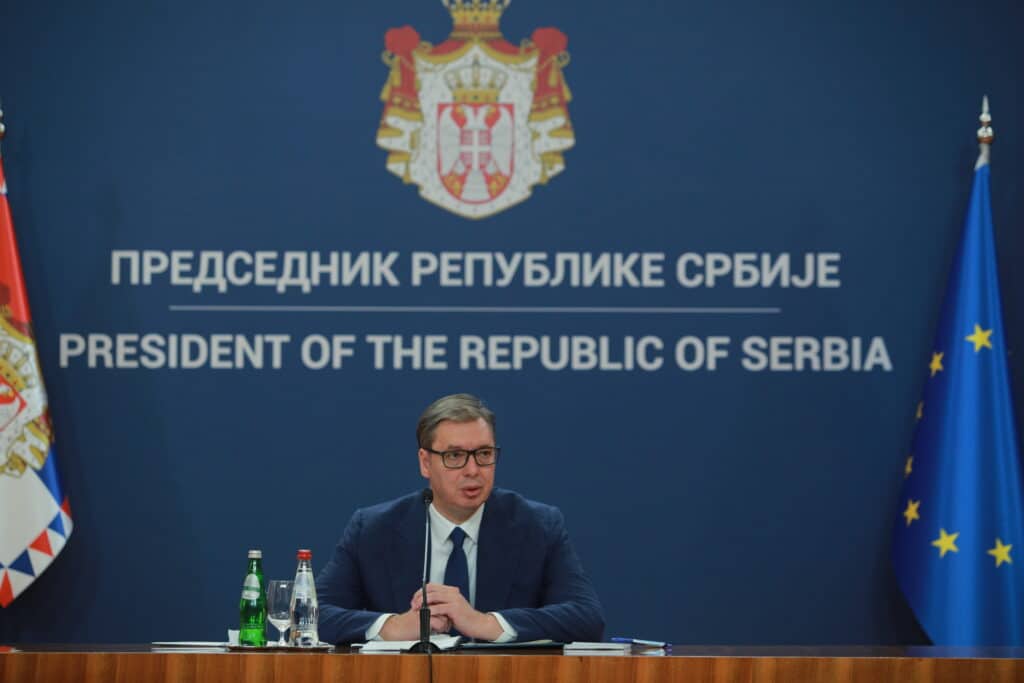EuroPride defiantly vows to go ahead as Serbian president claims celebration is ‘cancelled’

Belgrade Pride in 2017. (ANDREJ ISAKOVIC/AFP via Getty Images)
EuroPride has defiantly vowed to host the event in Belgrade even after Serbia’s president claimed it has been cancelled.
For Serbia’s LGBTQ+ community, hosting EuroPride in the capital city in September was intended as a way to celebrate diversity and push for more rights in the deeply conservative country.
But Serbia’s strongman president, Aleksandar Vučić, claimed EuroPride won’t be happening amid growing tension with Kosovo, he said at a press conference in Belgrade on Saturday (27 August).
The leader of the nationalist Serbian Progressive Party told reporters: “The Pride parade that was scheduled for the month of September will be postponed or cancelled, or whatever that miracle is called, it doesn’t matter.
“We can’t at this moment when we have both the open Balkans and the crisis in Kosovo and Metohija that will not end at least until 31 October, we have no progress, we have nowhere to move. We have to deal with energy, and drought, we have many crises.”
He said prime minister Ana Brnabić on behalf of the government “will explain everything in accordance with the law”, according to television network Nova S.
But EuroPride won’t be shut down anytime soon, European Pride Organisers Association (EPOA) president Kristine Garina said.
“President Vučić cannot cancel someone else’s event. EuroPride is not cancelled, and will not be cancelled,” the Latvian activist said.
“EuroPride in Belgrade will not be cancelled and will bring together thousands of LGBTI+ people from across Europe with LGBTI+ people from Serbia and the wider western Balkans.”
Garina pointed to a letter to the EPOA in 2019 from Brnabić in which she backed Belgrade Pride’s bid to host EuroPride.

Serbian president Aleksandar Aleksandar Vučić said EuroPride was ‘cancelled’. (Milos Miskov/Anadolu Agency via Getty Images)
“The government I lead is committed to ensuring the full respect of human rights and of all citizens and we hereby promise to help the Belgrade Pride organising team in ensuring a safe and successful organisation of EuropPride in Belgrade in 2022,” she wrote at the time.
To ban a Pride event, Garina said, would violate Serbia’s commitment to the European Convention of Human Rights.
“Aside from the illegality of such a ban, it must be noted that those opposing EuroPride in Belgrade are using tired old tropes, inaccuracies and downright lies to discredit what is, in fact, a celebration of human rights and equality,” she continued.
“They say that we are against family values when all of us comes from a family and many of us have families of our own. They say that we are child abusers when we all stand firm against all child abuse.”
EuroPride, a nearly month-long festival, has been held almost every year since 1992 when London, England, first hosted the event.
Belgrade Pride won the right to host EuroPride in a landslide vote by the EPOA, the European counterpart of the InterPride association, in 2019.
But the thought of it being held on Serbian soil has led to years of backlash, with protesters storming the streets of Belgrade and high-ranking religious leaders calling for armed attacks against Pride-goers.
British-Serbian activist Nik Jovčić-Sas sees tensions are higher than ever before as Vučić drags the country further and further right.
“Vučić is simply pandering to the far-right, who are violently opposed to EuroPride. It’s hard to know if this is serious or just political manoeuvring – the president cannot ban a public gathering, only the police have that power and they have yet to do so,” Jovčić-Sas told PinkNews.
Since Vučić won the presidency in 2017, the quality of Serbian democracy has fallen from “free” to only “partly free”, according to Freedom House, an independent rights research group.
If the president does find a way to make LGBTQ+ Serb’s dreams of hosting the event come crashing down, Jovčić-Sas expects the backlash to be swift.
“We will not allow compromise on our fundamental human rights,” he said.

